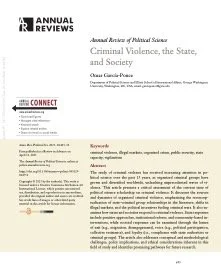By Omar García-Ponce
The study of criminal violence has received increasing attention in political science over the past 15 years, as organized criminal groups have grown and diversified worldwide, unleashing unprecedented waves of violence. This article presents a critical assessment of the current state of political science scholarship on criminal violence. It discusses the sources and dynamics of organized criminal violence, emphasizing the reconceptualization of state–criminal group relationships in the literature, shifts in illegal markets, and the political incentives fueling criminal wars. It also examines how states and societies respond to criminal violence. State responses include punitive approaches, institutional reform, and community-based interventions, while societal responses can be examined through the lenses of exit (e.g., migration, disengagement), voice (e.g., political participation, collective resistance), and loyalty (i.e., compliance with state authorities or criminal groups). The article also addresses conceptual and methodological challenges, policy implications, and ethical considerations inherent in this field of study and identifies promising pathways for future research.
Annu. Rev. Political Sci. 2025. 28:435–56



